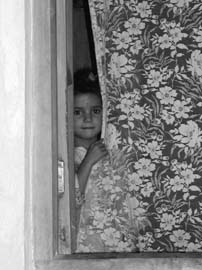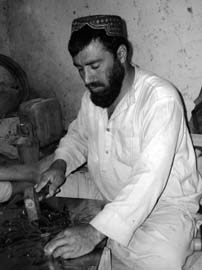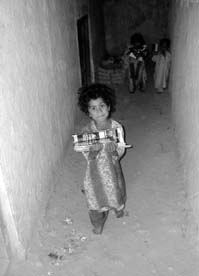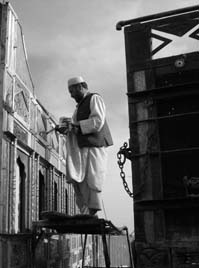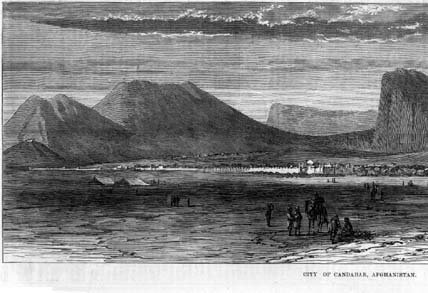The Punishment of Virtue (21 page)
Read The Punishment of Virtue Online
Authors: Sarah Chayes

MILITARY MATTERS
2002-2004
P
ART OF WHAT
prompted Akrem to break the ice between us was that he possessed information vital to the American mission in Afghanistan, and he wanted to communicate it. But the Americans were swaddled in their alliance with Gul Agha Shirzai. With Shirzai's eyes and ears hemming them in, the U.S. troops were unapproachable. Akrem had pegged me for a back channel.
He got the reasons for it wrongâmy contacts with American officials were due to fluke and longevity, not professional affiliationâbut in substance, he was right. I did turn out to be a back channel to army officers, among others.
The entrance to the airport, where the U.S. military established its base, has been gussied up a bit since Al-Qaeda's last stand there. A Soviet MIG that miraculously escaped being sold for scrap, painted with new camouflage and a menacing grin, guards the turnoff. Behind it, great metal gates with a plaque inscribed in honor of Gul Agha Shirzai bar the road. Spherical marble guardhouses, like big golf balls, flank the gates, and a matching marble-clad barracks has reared up just inside. It is for Shirzai's fighters, who secureâand controlâthe outer perimeter.
It was no mean prize President Karzai offered Gul Agha Shirzai when he told him to hold the airport as the Taliban regime was collapsing. Shirzai defied the president and took the governorship, and he kept the airport too.
Despite the visible expense, there is something desultory about his efforts at embellishment. Beyond the gate and its gaudy new protuberances, the road stretches for half a mile across the sun-baked, dust-swept emptiness to another set of gates. Tall, lopsided pine trees that once studded the grounds were mostly cut down by the U.S. troops in order to deny potential enemies cover. The rest, untended, have developed sickly, brownish-yellow blemishes on their drooping needles. For a time the earth was pocked with foxholes where the U.S. Marines were hunkered down that first Christmas, but gradually the holes were filled in and the soldiers moved to tents; then the tents gained plywood floors set up off the ground. Now most of the buildings on base are made of wood.
I dreaded going out there, because of the time it always took. You would park your truck at the far side of a kind of traffic islandâwithout the trafficâthen walk a hundred yards to a rust-brown iron bar slung across the road with a hinge at one end and a piece of rope at the other for hoisting it up and down. This was Gate 2. When the military police officer spied you through the slit in a sandbagged bunker set back about thirty yards behind it, he would amble over, his pace designed to not jack up his body heat, as he sweltered inside full combat gear: helmet, long-sleeved desert camouflage, twenty pounds of bulletproof plate inside his vest, ankle-high boots, magazines at his belt, black M-16 slung over his shoulder. He would inspect your ID, then walk back to the bunker and call in your details and the name of the person you wanted to see.
Then you would wait anywhere from one to three hours, in the scorched, dust-filled wind, for an escort to arrive.
Various things struck me about this process. The extremely rudimentary nature of the communications systems in use, for one. There was no way to reach a person on base from outside if you wanted to make an appointment, for example, to cut down the wait. Internet, which the soldiers relied on, was nonexistent in Kandahar. A few U.S. officers obtained handheld satellite telephones, like old-fashioned walkie-talkies with fat antennas that you have to struggle to get pointed in the right direction, whirling around while you're talking or leaning over to get the angle right. But they were of the U.S.-owned Iridium variety, incompatible with the Thurayas used in Kandahar.
The consequence was an impregnabilityânot just of the physical barriers made of sand bags and cement tank traps and loops of concertina wire, but the barriers to any form of communication between the Americans and people of the land in which they were operating.
Within the army, communications were just as bad. It took more than a year for the MPs manning the gate to get handheld walkie-talkies so they would not have to keep trudging back and forth, bunker to gate, gate to bunker. The walkie-talkies, I later learned, were not even issued by the U.S. government. The soldiers had bought them with their own money. Worse was the link back to the base proper, a few hundred yards inside the gate. To call in your details, the MP would unclamp the receiver from a heavy military telephone set and connect to something called the TOC, or Tactical Operations Center. The soldier who picked up there would then make a similar call over to Civil Affairs or whichever unit you needed to reach. And that is where things broke down. It never took less than half an hour for that connection to be made, let alone for Civil Affairs to send someone out to the gate.
The thought of relying on such haphazard links in an emergency did not fill me with confidence. Early on, I made a mental note that should disaster strike, ACS would forget about the U.S. Army and throw itself at the SAS, the highly capable British Special Air Service team right in town.
What also baffled me about getting on base were the constantly changing rules. Inefficiency might be par for the course, but I had always thought the army stuck to ironclad procedures. Not at Kandahar Airfield. Each visit brought new variations on the theme. Usually I was searched going in, but often I wasn't. One MP team might invite us to have a seat in their bunker while we waited, passing us cold bottles of Gatorade and allowing us to make conversation. Another group might stare at us stonily, ordering us back from the iron bar to await our escort at the traffic island. Most Civil Affairs teams were happy to see us any time. But one rotation told us we could only come on Fridays.
For a few monthsâon the Shirzais' say-soâI became persona non grata and could not get on base at all. Various excuses would be made when I pulled up after the half hour drive from town: there was a security alert, no one was allowed on, or no escort was available. I would watch people I knew were working for Pakistani intelligence get waved on base, while I, a born and bred American, was left with my ruffled feathers in the dust.
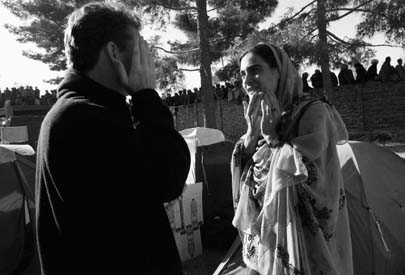
The BBC's Adam Brookes and me, guests of the Taliban, applying moisturizer under the rather unnerving stares of Spin Boldak folk, perched on the walls of our compound in late November 2001.
(R
UTH
F
REMSON
/
THE NEW YORK TIMES
)
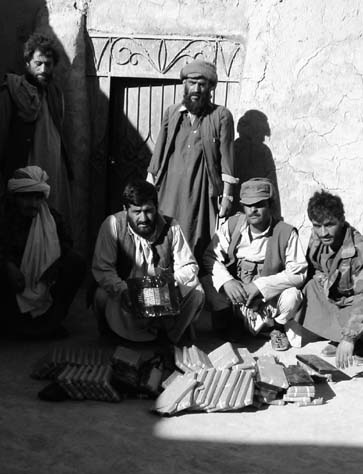
My Achekzai friends from the barracks at the border, showing off the haul from a drug bust, March 2002.
